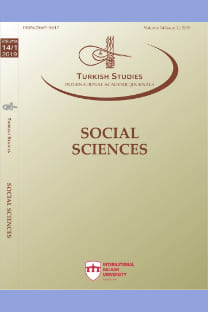DEMOKRATİKLEŞME LİTERATÜRÜNÜN SINIF TEMELLİ AÇIKLAMALARINI ANLAMAK
UNDERSTANDING THE CLASS-BASED EXPLANATIONS OF THE DEMOCRATIZATION LITERATURE
___
- Acemoglu, D., & Robinson, J. A. (2006). Economic Origins of Dictatorship and Democracy. Cambridge University Press.
- Almond GA., & Verba S. (1963). The Civic Culture. Boston, MA: Little, Brown.
- Almond GA., & Verba S. (1989). The Civic Culture Revisited. Newbury Park, CA: Sage.
- Ansell, B., & Samuels, D. (2010).” Inequality and Democratization: A Contractarian Approach”. Comparative Political Studies, 43(12), 1543-1574.
- Boix, C. (2003). Democracy and Redistribution. Cambridge University Press.
- Bollen, K. A. (1979). “Political Democracy and the Timing of Development”. American Sociological Review, 572-587.
- Bollen, K. A. (1980). “Issues in the Comparative Measurement of Political Democracy”. American Sociological Review, 370-390.
- Diamond, L. (1992). “Economic Development and Democracy Reconsidered”. American Behavioral Scientist, 35(4-5), 450-499.
- Diamond, L. (1999). Developing democracy: Toward consolidation. JHU Press.
- Diamond, L. (2011). “Why Democracies Survive,” Journal of Democracy, 22, 1, pp.17-30.
- Diamond. L. (2008). The Spirit of Democracy: The Struggle to Build Free Societies throughout the World. Palgrave Macmillan.
- Epstein, D. L., Bates, R., Goldstone, J., Kristensen, I., & O’Halloran. S. (2006). “Democratic Transitions.” American Journal of Political Science 50 (July): 551–69.
- Houle, C. (2009). “Inequality and democracy: Why Inequality Harms Consolidation but Does not Affect Democratization”. World Politics, 61(4), 589-622.
- Inglehart R. (1977). The Silent Revolution: Changing Values and Political Styles. Princeton, NJ: Princeton Univ. Press.
- Inglehart R. (1990). Culture Shift in Advanced Industrial Society. Princeton, NJ: Princeton University Press.
- Inglehart R. (1997). Modernization and Postmodernization: Cultural, Economic, and Political Change in 43 Societies. Princeton, NJ: Princeton Univ. Press.
- Lipset, S. M. (1959). “Some Social Requisites of Democracy: Economic Development and Political Legitimacy”. American Political Science Review, 53(1), 69-105.
- Marx, K., & Engels, F. (1848). Bourgeois and Proletarians. Manifesto of the Communist Party.
- Moore, B. (1993). Social Origins of Dictatorship and Democracy: Lord and Peasant in the Making of the Modern World (Vol. 268). Beacon Press.
- Przeworski, A., & Limongi, F. (1997). “Modernization: Theories and Facts”. World Politics, 49(2), 155- 183.
- Putnam R. (1993). Making Democracy Work: Civic Traditions in Modern Italy. Princeton, NJ: Princeton Univ. Press.
- Rueschemeyer, D., Stephens, E. H., & Stephens, J. D. (1992). Capitalist Development and Democracy (Vol. 22). Polity: Cambridge.
- Stephens, J. D. (1989). “Democratic Transition and Breakdown in Western Europe, 1870-1939: a Test of the Moore Thesis”. American Journal of Sociology, 94(5), 1019-1077.
- Therborn, G. (1977). Science, Class and Society: On the Formation of Sociology and Historical Materialism.
- Treisman, D. (2011). Income, democracy, and the cunning of reason (No. w17132). National Bureau of Economic Research.
- Welzel, C., & Inglehart, R. (2007). “Mass Beliefs and Democratic Institutions.” In Oxford Handbook of Comparative Politics, eds. Carles Boix and Susan C. Stokes. New York: Oxford University Press, 297–316.
- Ziblatt, D. (2008). “Does Landholding Inequality Block Democratization?: A Test of the “Bread and Democracy Thesis and the Case of Prussia”. World Politics, 60(4), 610-641.
- ISSN: 2667-5617
- Yayın Aralığı: 6
- Başlangıç: 2006
- Yayıncı: ASOS Eğitim Bilişim Danışmanlık Otomasyon Yayıncılık Reklam Sanayi ve Ticaret LTD ŞTİ
YAŞAMDA ANLAM VARLIĞININ ÖRGÜTSEL PSİKOLOJİK SERMAYE İLE İLİŞKİSİ
SURİYELİ KADINLARIN İŞGÜCÜNE KATILIMI VE DENEYİMLERİ (İSTANBUL-SULTANBEYLİ ÖRNEĞİ)
Hasan Hüseyin AYGÜL, Emine Merve KABA
OSMANLI’DAN CUMHURİYET’E KENEVİR ÜRETİMİ
Deniz AKPINAR, Ahmet NİZAMOĞLU
DEMOKRATİKLEŞME LİTERATÜRÜNÜN SINIF TEMELLİ AÇIKLAMALARINI ANLAMAK
Ceren ÜNAL, H. Sibel ÜNALAN ÖZDEMİR
FARKLI KREDİ TÜRLERİ İÇİN BANKA STRATEJİLERİNİN OYUN TEORİSİ YAKLAŞIMI İLE İNCELENMESİ
İLİŞKİSEL PAZARLAMA UYGULAMALARININ MARKA SADAKATİ ÜZERİNDEKİ ETKİSİ ÜZERİNE BİR ARAŞTIRMA
